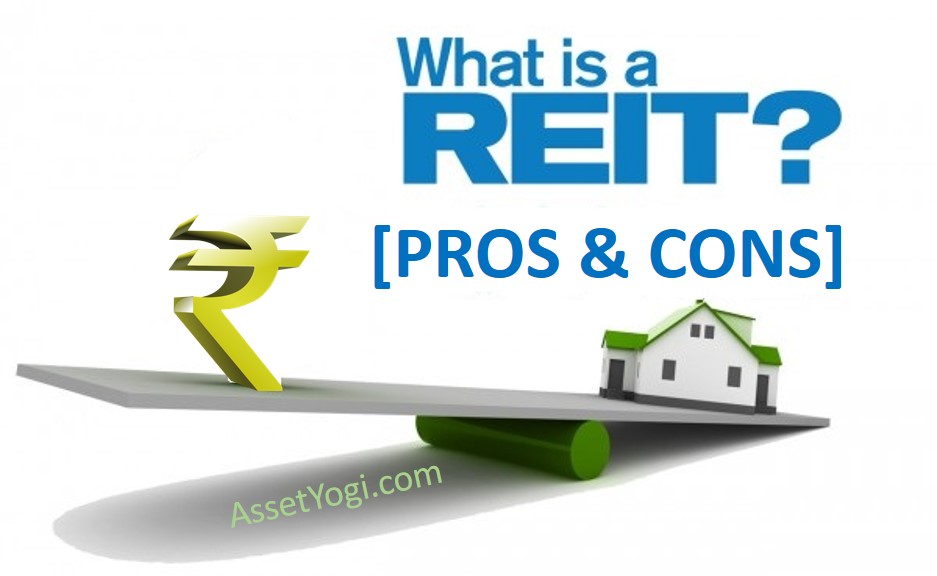REIT or Real Estate Investment Trust is a company or a Special Purpose Vehicle (SPV) that owns or finances income-producing Real Estate Assets. Similar to mutual funds, REITs provide investors with regular income stream and diversification. A REIT pools money from investors and invests it in rented commercial properties. REIT issues units to investors, which are then listed on stock exchanges for trading.
REITs typically invest in commercial properties that include office space, shopping centers, retail malls, hotels, hospitality, industrial warehouses and other storage solutions. A REIT offers twin benefits of rental yield (in the form of recurring dividend payouts) as well as capital appreciation.
Now let us see why should we care about REITs by carefully looking at their Pros and Cons.
Pros of REIT
- Diversification – Over the long term, REITs show little correlation to the returns of the broader stock market. For small investors, REIT provides an opportunity to invest in large scale commercial properties, which was otherwise possible only for wealthy individuals or corporations. Also, investing in a REIT fund means you are investing in a portfolio of Real Estate which may comprise of IT parks, Commercial Office Space, Shopping Malls spread across multiple cities. This way you can earn stable returns with minimal risk.
- Lesser Risk – REITs are less risky compared to investing in under-construction property, as they invest in fully constructed and income generating properties. Investing in REITs can generate instant income and prevent you from going through agony of waiting for physical possession of the property. Also, REITs have restrictions on debt levels which reduces high leverage risks associated with Real Estate.
- Low Entry Cost – REITs have low cost of entry compared to direct Real Estate Investment. As per SEBI regulations, minimum investment in a REIT is kept at Rs. 2 lakhs which is significantly lower than the minimum cost for a commercial property in any urban area.
- Liquid Investment – A REIT investment works like a Mutual Fund investment. You can purchase and sell units at your will which makes entry and exit super easy. In comparison, a traditional Real Estate investment is perhaps the most illiquid investment. You may not be able to sell it when you actually need the money.
- Tax Concessions – Tax concessions on REITs ensure higher dividend payouts. Dividends are exempted from tax even at the hands of unit holders. Investors are also exempted from Capital Gains Tax if they hold REIT units for more than 36 months. These tax concessions make REITs even more attractive for retail investors.
- Transparency – REITs improve transparency in the real estate markets as information is periodically disclosed on average rents, occupancy levels, tenant profile, buying and selling rate etc. Availability of such information reduces information asymmetry, which is typically seen in real estate markets.
- Professionally Managed – Like Mutual funds, REITs are managed by qualified professional managers who rely on thorough market research before making buying, selling and renting decisions, unlike individual investors who do not have enough time and resources to conduct thorough research. Also, you do not have to take hassles of managing tenants, collecting rent and maintaining the property.

Cons of REIT
- Market Volatility: Given REITs are listed on stock exchanges, they are exposed to market volatility, and can significantly fall if the broader market falls. In comparison, physical property prices in India are more stable and generally increase in the long-run.
- Management Fees: A REIT charges management fees, which could include sales commissions, manager fee, organization expenses, acquisition expenses etc. Thus, a part of your investment gets allocated towards these charges, which can significantly lower your overall returns.
- Lower Returns compared to Direct Investment: Given the fees associated with REIT investments the returns can be lower than actual commercial property investment. However, one needs to remember that managing commercial properties is difficult compared to managing residential properties and requires right skills. Also, as REITs present limited risks one should be willing to expect lower returns.
- Lack of Control: Unlike your direct Real Estate investments, you do not have direct control over properties managed by REIT. All investment and property management decisions are taken by the portfolio manager.
Conclusion
REIT is a good alternative investment channel by which you can invest in Real Estate indirectly like you invest in shares indirectly via Mutual Funds. REITs have helped in organizing Real Estate sector in many countries. REIT can act as the much needed vehicle that can bring transparency, professionalism and trust in Indian Real Estate industry. With increase in FDI, we can expect rise in quality commercial real estate in India.
Now that you have an unfair advantage over many others who are not even aware of this investment option, would you not like to take advantage of your knowledge and invest in REIT?
Over to You
We need your love! Like, Share and Rate the article if you found it useful.
Have something to say or ask? Please comment below.

